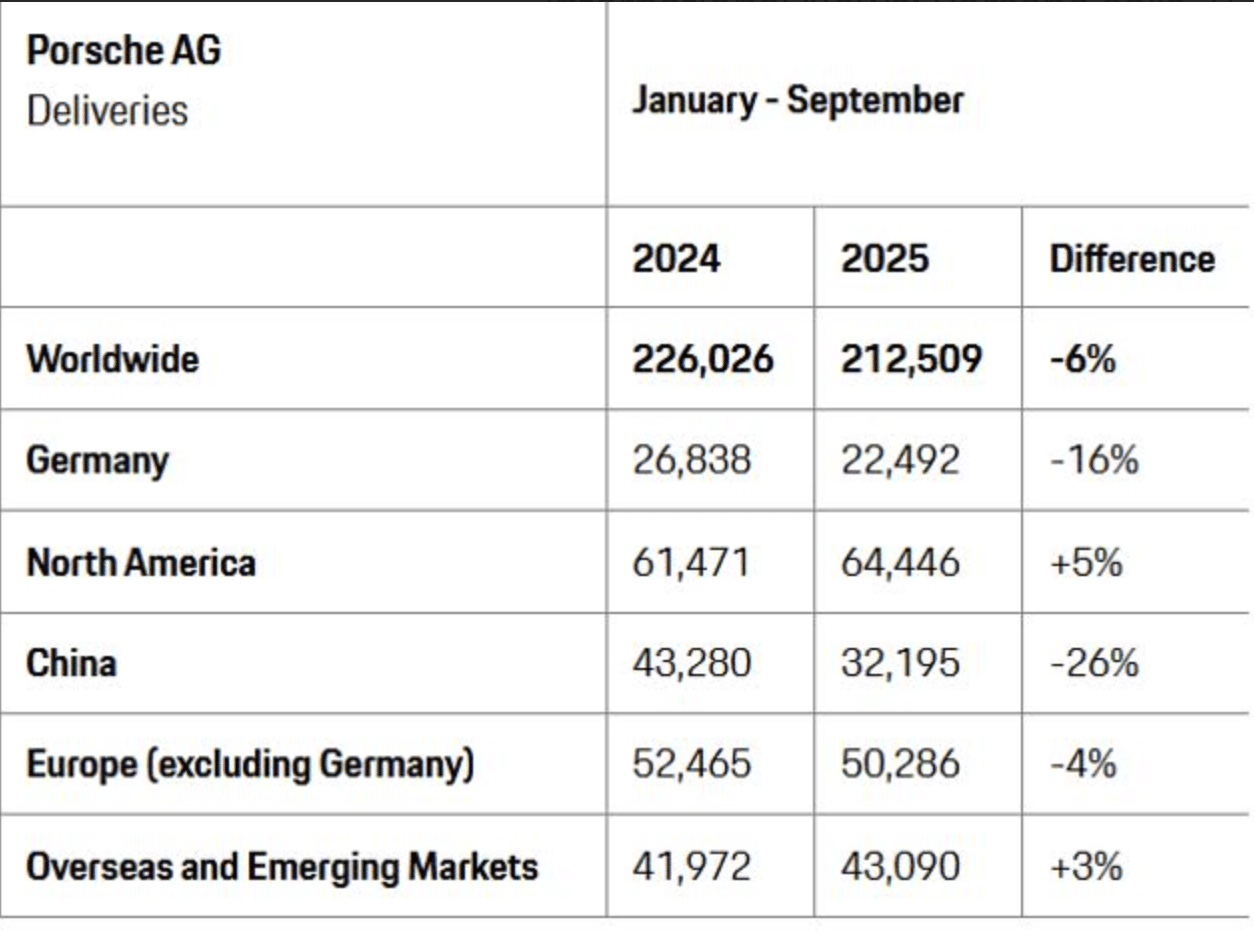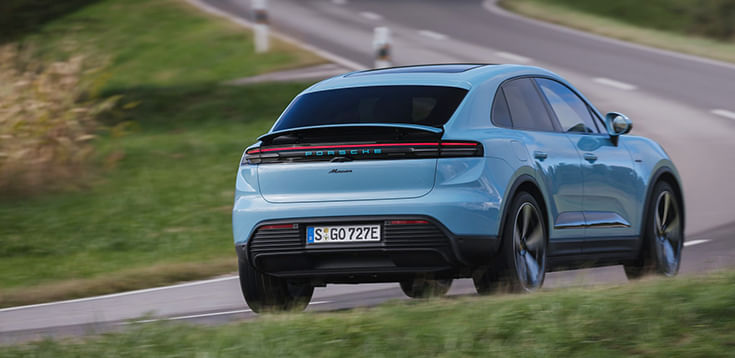Porsche has significantly increased the proportion of electrified vehicles sold in the first nine months of 2025 in a challenging business environment. The German sportscar and SUV manufacturer sold a total of 212,509 cars to customers worldwide between January and September 2025, down 6% YoY (January-September 2024: 212,509 units). Of this, 35.2% were electrified (+12.8 percentage points). While fully electric vehicles comprised 23.1%, 12.1% were plug-in hybrids.
Porsche increased its market share worldwide in the respective segments of five of six model lines – despite increasing competition. The strongest growth among the sports car manufacturer’s six model lines was recorded by the Macan, with an 18% YoY increase. This contributes significantly to a high electrification rate of 56% in Europe (Region Europe including Germany). North America remains the largest sales region, with 64,446 deliveries representing a 5% increase compared to the previous year. The Overseas and Emerging Markets achieved a new all-time high with 43,090 deliveries from January to September.
“Porsche continues to maintain robust delivery figures this year. The level is in line with our expectations, especially considering the ongoing geopolitical and economic conditions,“ said Matthias Becker, Member of the Executive Board for Sales and Marketing at Porsche AG. “In the coming months, our customers can look forward to many exceptional product offerings. We recently unveiled the new 911 Turbo S at the IAA, the range-topping version of our iconic sports car. This strengthens our brand core. Demand for the new flagship is very strong, and the car has received a lot of praise from the media and prospective customers.”

With 64,446 deliveries, a 5% increase YoY, North America remains the largest sales region for Porsche.
Growth in North America and Overseas and Emerging Markets
North America remains the largest sales region, recording 64,446 deliveries – a 5% increase compared to the same period in 2024. The Overseas and Emerging Markets also performed well, posting a 3% increase and achieving a new all-time high of 43,090 vehicles were delivered to customers in this region.
In Europe (excluding Germany), Porsche delivered 50,286 vehicles up to the end of September, a 4% decrease YoY. In the brand’s home market of Germany, 22,492 deliveries were made, a 16% decrease. The decline in both regions, according to Porsche, is partly due to a strong period the previous year with catch-up effects from 2023 and limited model availability in the 718 and Macan combustion-engine models due to EU cybersecurity regulations.
In China, 32,195 cars were delivered to customers (-26%). The primary reasons for this decline remain the challenging market conditions, particularly in the luxury segment, and the intense competition in the Chinese market. The focus here remains on value-oriented sales.

The Macan SUV remains the best-selling Porsche model and accounted for 30% of total sales in January-September 2025.
Macan best-selling model: 64,783 units, 55% fully electric
In the first three quarters of 2025, 64,783 units of the Macan SUV were delivered to customers (+18%), accounting for 30% of Porsche’s global sales. More than 55% of these (36,250 cars) were fully electric. Meanwhile, the combustion-engine Macan continues to be offered in most markets outside the EU, with 28,533 examples delivered. Between January and September, 21,243 examples of the Panamera were delivered to customers, with figures remaining at a stable level (-1 per cent).
Deliveries of the iconic 911 totalled 37,806 up to the end of September, representing a slight decrease of 5 percent. The 718 Boxster and 718 Cayman models recorded 15,380 deliveries, a 15% decrease compared to the previous year. This is mainly due to limited model availability resulting from EU cybersecurity regulations. Production of the current 718 model line will end in the fourth quarter of 2025.
A total of 12,641 all-electric Taycan models were delivered between January and September (-10%). For the Cayenne, the delivery figures totalled 60,656, representing a 22% decrease – partly due to catch-up effects from the previous year. The new fully electric Cayenne is planned to be unveiled in the fourth quarter. It will be offered alongside the current model, which offers both combustion-engine and plug-in hybrid powertrains.
“We have made forward-looking product decisions in recent weeks,” continued Matthias Becker. “In doing so, we’re responding to the diverse needs of customers worldwide and the slowing of the uptake of electric mobility, allowing us to be more flexible in the years to come. We expect the market environment to remain challenging in the future. More than ever, we’re focusing on managing demand and supply in line with our ‘value over volume’ strategy. We’re also responding to the ever-increasing customer demand for individualisation of our vehicles by expanding further in this area – with both the Exclusive Manufaktur and the Sonderwunsch programmes.”
ALSO READ: Electrified vehicles capture 51% of UK new car sales in September
